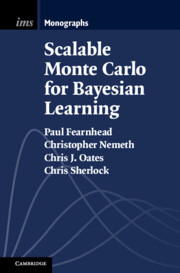Refine search
Actions for selected content:
2721 results in General statistics and probability
Contents
-
- Book:
- High-Dimensional Probability
- Published online:
- 30 January 2026
- Print publication:
- 19 February 2026, pp v-viii
-
- Chapter
- Export citation

High-Dimensional Probability
- An Introduction with Applications in Data Science
-
- Published online:
- 30 January 2026
- Print publication:
- 19 February 2026
2 - Reversible MCMC and Its Scaling
-
- Book:
- Scalable Monte Carlo for Bayesian Learning
- Published online:
- 16 May 2025
- Print publication:
- 05 June 2025, pp 39-61
-
- Chapter
- Export citation
References
-
- Book:
- Scalable Monte Carlo for Bayesian Learning
- Published online:
- 16 May 2025
- Print publication:
- 05 June 2025, pp 225-234
-
- Chapter
- Export citation
1 - Background
-
- Book:
- Scalable Monte Carlo for Bayesian Learning
- Published online:
- 16 May 2025
- Print publication:
- 05 June 2025, pp 1-38
-
- Chapter
- Export citation
Index
-
- Book:
- Scalable Monte Carlo for Bayesian Learning
- Published online:
- 16 May 2025
- Print publication:
- 05 June 2025, pp 235-238
-
- Chapter
- Export citation
Preface
-
- Book:
- Scalable Monte Carlo for Bayesian Learning
- Published online:
- 16 May 2025
- Print publication:
- 05 June 2025, pp ix-x
-
- Chapter
- Export citation
Frontmatter
-
- Book:
- Scalable Monte Carlo for Bayesian Learning
- Published online:
- 16 May 2025
- Print publication:
- 05 June 2025, pp i-iv
-
- Chapter
- Export citation
5 - Continuous-Time MCMC
-
- Book:
- Scalable Monte Carlo for Bayesian Learning
- Published online:
- 16 May 2025
- Print publication:
- 05 June 2025, pp 123-188
-
- Chapter
- Export citation
6 - Assessing and Improving MCMC
-
- Book:
- Scalable Monte Carlo for Bayesian Learning
- Published online:
- 16 May 2025
- Print publication:
- 05 June 2025, pp 189-224
-
- Chapter
- Export citation
Notation
-
- Book:
- Scalable Monte Carlo for Bayesian Learning
- Published online:
- 16 May 2025
- Print publication:
- 05 June 2025, pp xi-xii
-
- Chapter
- Export citation
4 - Non-Reversible MCMC
-
- Book:
- Scalable Monte Carlo for Bayesian Learning
- Published online:
- 16 May 2025
- Print publication:
- 05 June 2025, pp 103-122
-
- Chapter
- Export citation
Contents
-
- Book:
- Scalable Monte Carlo for Bayesian Learning
- Published online:
- 16 May 2025
- Print publication:
- 05 June 2025, pp v-viii
-
- Chapter
- Export citation
3 - Stochastic Gradient MCMC Algorithms
-
- Book:
- Scalable Monte Carlo for Bayesian Learning
- Published online:
- 16 May 2025
- Print publication:
- 05 June 2025, pp 62-102
-
- Chapter
- Export citation

Scalable Monte Carlo for Bayesian Learning
-
- Published online:
- 16 May 2025
- Print publication:
- 05 June 2025
7 - Spatial Dependent Sequences
-
- Book:
- Dependence Models via Hierarchical Structures
- Published online:
- 20 March 2025
- Print publication:
- 27 March 2025, pp 102-117
-
- Chapter
- Export citation
2 - Conjugate Models
-
- Book:
- Dependence Models via Hierarchical Structures
- Published online:
- 20 March 2025
- Print publication:
- 27 March 2025, pp 23-32
-
- Chapter
- Export citation
Preface
-
- Book:
- Dependence Models via Hierarchical Structures
- Published online:
- 20 March 2025
- Print publication:
- 27 March 2025, pp ix-xii
-
- Chapter
- Export citation
Acknowledgments
-
- Book:
- Dependence Models via Hierarchical Structures
- Published online:
- 20 March 2025
- Print publication:
- 27 March 2025, pp xiii-xiv
-
- Chapter
- Export citation
Dedication
-
- Book:
- Dependence Models via Hierarchical Structures
- Published online:
- 20 March 2025
- Print publication:
- 27 March 2025, pp v-vi
-
- Chapter
- Export citation
